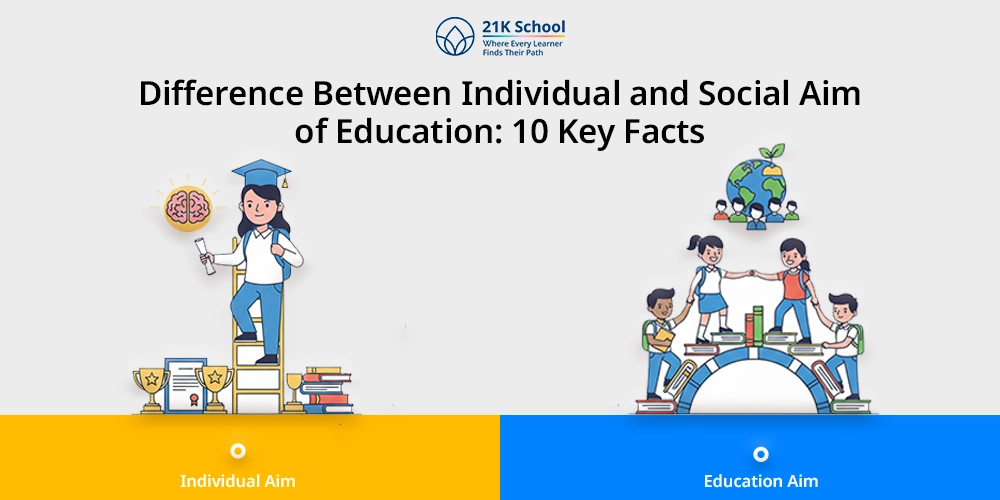
Do you use letters instead of phones to send your messages? Or do you walk miles with your bare foot instead of using a cycle /bike/car?
Ain’t these things sound absurd, as who will do all these in the 21st century where everything is so advanced and hi-tech?
This shows that with change in time, the requirements keep on changing, and to fulfil that we develop new things. Similarly, to survive in this modern world where innovation is everything, we must not be stuck to academic books and make efforts to learn skills.
In today’s world, Skill-based education is paramount and so we are here to discuss it. Let’s delve into the details below-
Table of Contents
- What Is Skill-based Education?
- 10 Reasons Why Skill‑Based Education Is Important in 2025
- 1. Promoting Lifelong Learning
- 2. Bridging the Gap between Education and Employment
- 3. Enhancing Employability
- 4. Promoting Personal Growth and Self-Empowerment
- 5. Fostering Entrepreneurship and Innovation
- 6. Adaptability
- 7. Enhanced Career Opportunity
- 8. Boosts Economic Development
- 9. Reduces Unemployment
- 10. Promotes Holistic development
- Case Studies & Real-World Examples
- Conclusion
What Is Skill-based Education?
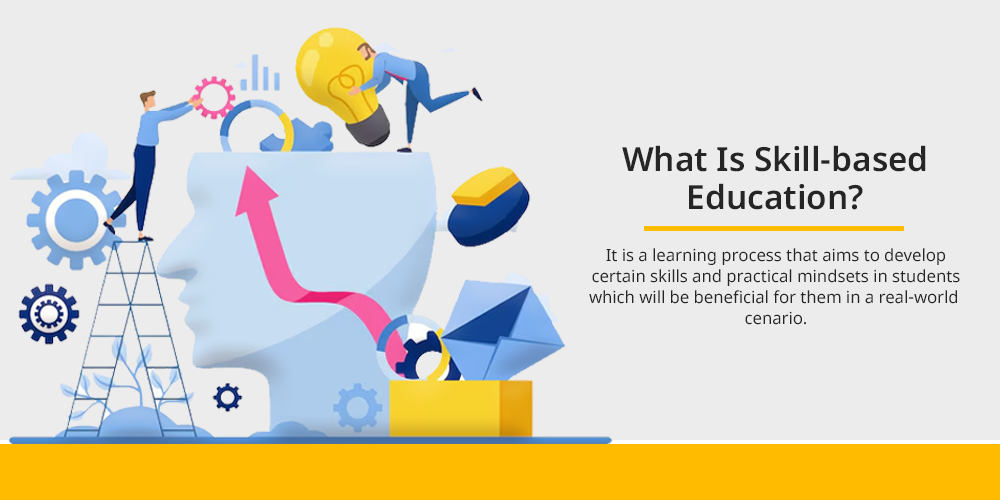
Skill-based education refers to a learning process that aims to develop certain skills and practical mindsets in students which will be beneficial for them in a real-world scenario rather than focusing on learning only theoretical knowledge and information as it was traditionally done.
It is of great importance in this competitive world, as the application of what you have learned plays a significant role in developing goods and services.
This system helps students to implement their ideas and knowledge to solve real-life problems and the knowledge of various skills like technical, digital, communication, interpersonal, importance of leadership, and entrepreneurship helps them stand out from the crowd.
Nowadays it has been thoroughly observed that no matter what degree a person holds, they are judged by the services they can provide to deal with the actual problems.
They are easily hired by the top companies or even start their own business. In a way, if we look at it, this is all that matters is how one can translate their ideas into application.
10 Reasons Why Skill‑Based Education Is Important in 2025
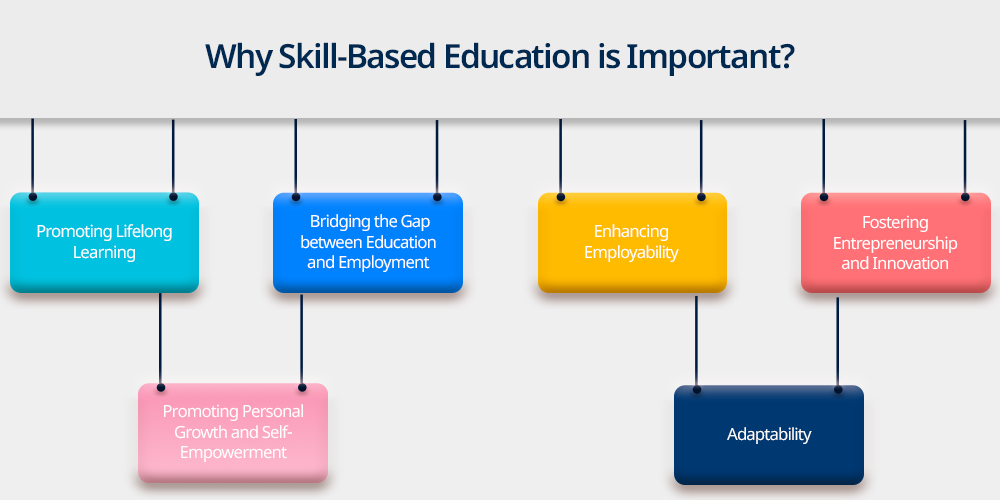
As in the traditional way of learning students were more focused on memorising the concepts, rather than applying them which was a drawback of the system.
Therefore, nowadays the curriculum is revised in a way where they are more encouraged to apply that knowledge and develop some ideas to implement it in real life.
It is of great importance as it will develop an entrepreneurial mindset in students which can lead to some great ideas which can change the world.
For various job opportunities as well this is the need of the hour, people with a great set of technical, communication, and leadership skills are hired rather than one with a decent degree without any skills.
The skill-based education system is making students well-equipped with decent skills that provide their credibility and visibility in this competitive environment.
Through this article, you will get to learn in a better and broader way why skill-based education is of paramount importance. Let’s delve deeper into this through the following points:
Also, read The Importance Of Skill Development in School Education to understand why schools should start working on skill growth of children.
1. Promoting Lifelong Learning
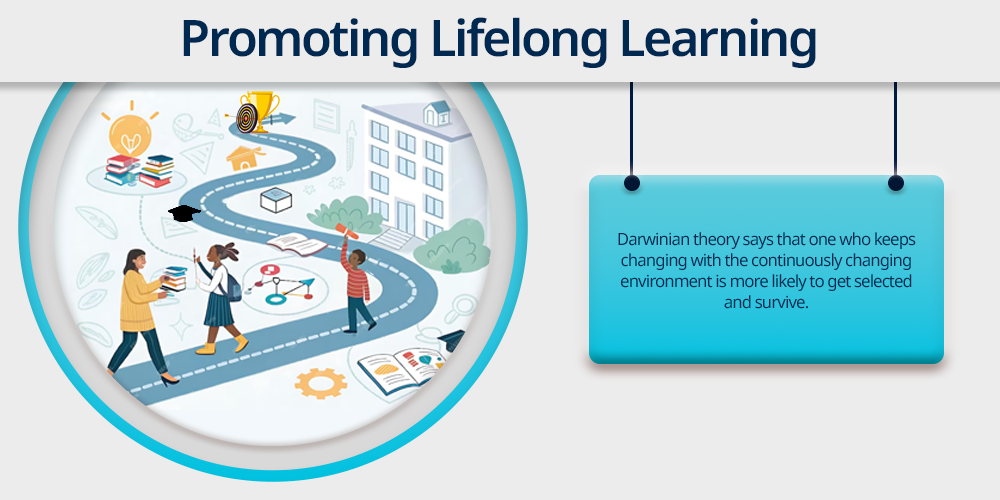
The Darwinian theory says that one who keeps changing with the continuously changing environment is more likely to get selected and survive, in a nutshell, “survival of the fittest”.
This theory truly explains the role of skill-based education in promoting lifelong learning and motivating people to keep themselves updated with the constantly changing environment.
Skills are something that can be acquired throughout life with the willingness to learn. These days online learning platforms have made it easy and accessible for everyone who wants to learn.
2. Bridging the Gap between Education and Employment
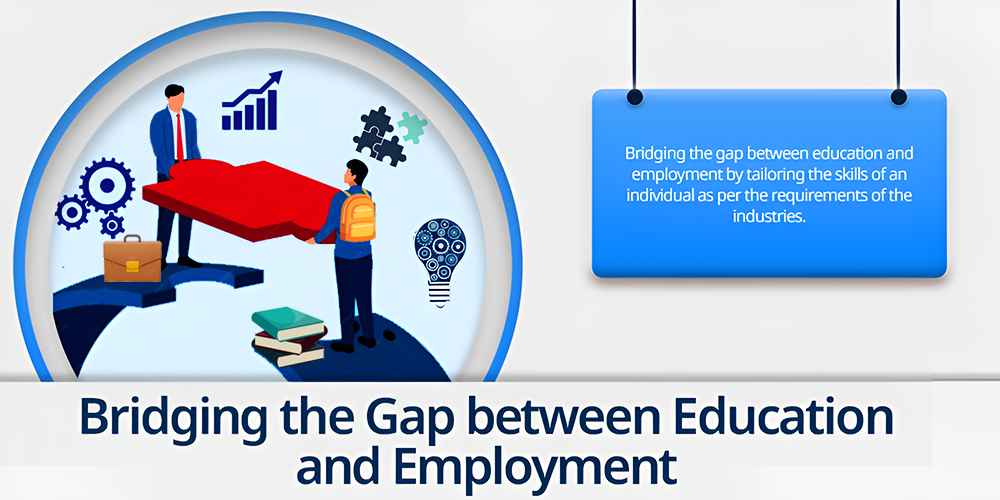
Earlier a huge gap was observed between the skills one had and the one needed to get a job.
Skill-based education focuses on bridging the gap between education and employment by tailoring the skills of an individual as per the requirements of the industries.
It keeps people updated with the changing dynamics of job requirements and helps them acquire those skills.
3. Enhancing Employability
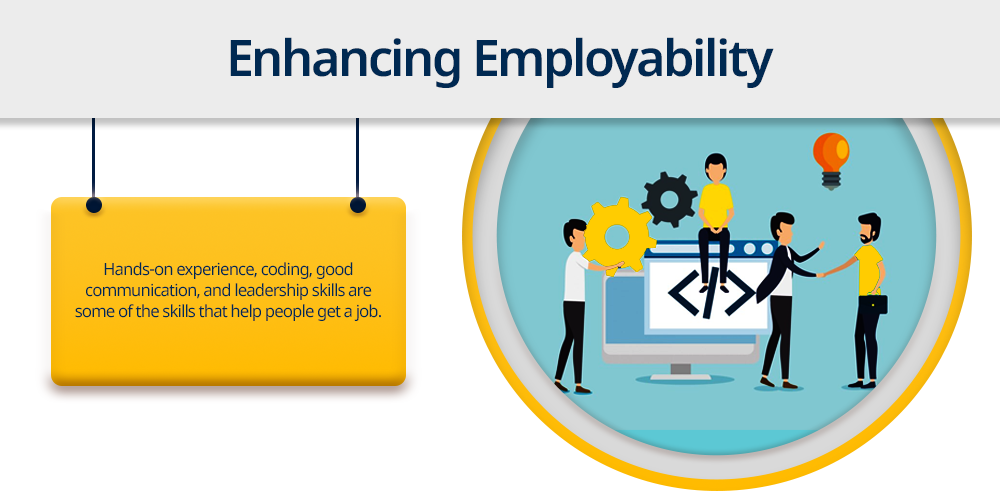
As mentioned above, people are more valued based on their problem-solving skills rather than a degree without skills. Hands-on experience, coding, good communication, and leadership skills are some of the skills that help people get a job.
It again depends on the sector you are applying for, every sector has its requirements. One can prepare well by acquiring job-specific skills and increase their chances of getting hired.
These skills assure the employer about the value that one can add to the company. There are schools like “21K School” which offer skill-based programs to make students aware of the importance of skills for today’s world.
4. Promoting Personal Growth and Self-Empowerment
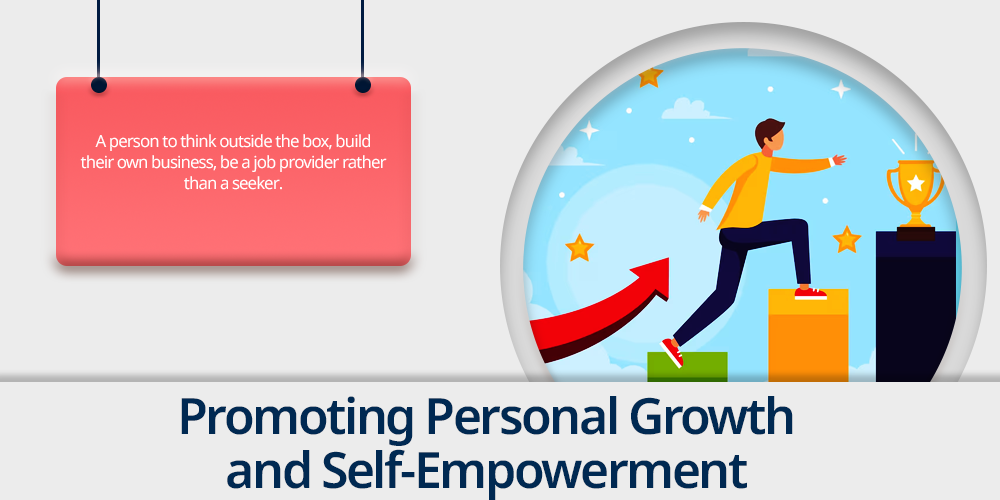
Acquiring the skills that interest you and also align with the job profile is surely going to get you huge success in the future not only professionally but personally too.
Knowing always works as a confidence booster. With all the skills, people have the confidence to follow their passion and have a fulfilling career.
It empowers a person to think outside the box, build their own business, be a job provider rather than a seeker, cultivate their talents, and follow their dreams. These people not only empower themselves but also inspire others.
5. Fostering Entrepreneurship and Innovation
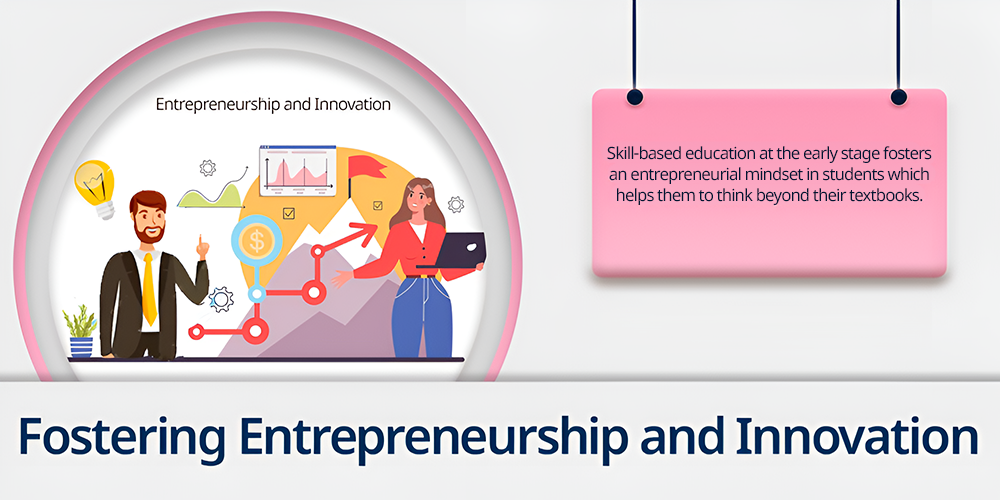
Skill-based education at the early stage fosters an entrepreneurial mindset in students which helps them to think beyond their textbooks.
With all the desired skills people can think of innovative solutions to the existing problems and can see their ideas come to life.
6. Adaptability
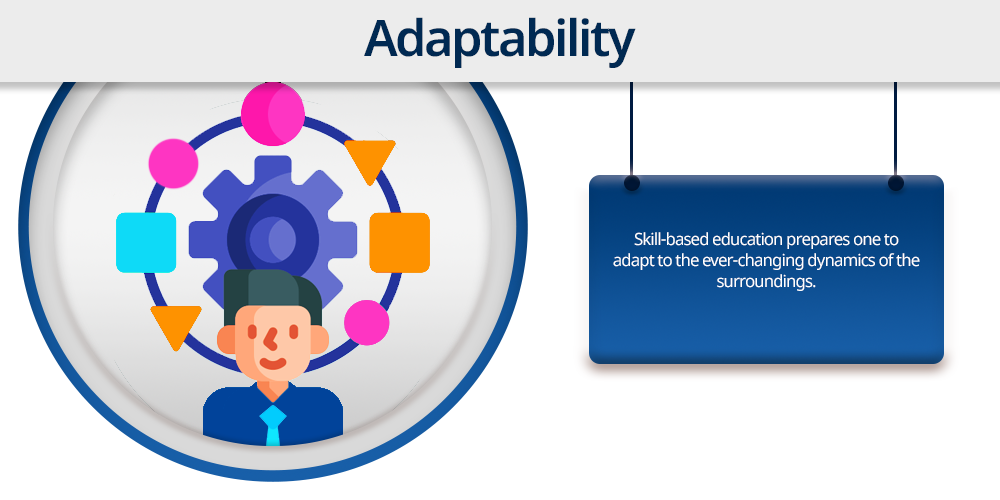
With the changing environment, it is very important to keep oneself updated with the latest technology to sustain. Skill-based education prepares one to adapt to the ever-changing dynamics of the surroundings.
Getting equipped with the relevant skills in your field makes you feel confident among your peers and will help you perform better. It also secures your position in a company to a large extent.
Again using Darwin’s theory as a reference those who change with the changing environment and adapt well are highly likely to get selected.
7. Enhanced Career Opportunity
The education based on skills provides the students with practical skills which are directly related to the industry needs. These programs equip learners to deal with real world challenges as opposed to purely theoretical programs.
This is the case whether in digital marketing, data analytics, EV repair or AI, practical skills are a massive booster to job placements.
As found out in India Skills Report 2025, vocationally trained students are 35-50 percent more employable than conventional degrees.
8. Boosts Economic Development
One of the main stimuli of the economic growth of the country is a skilled workforce.
Investments in youth skills commonly bring innovation, industrial productivity, and foreign investment in countries that invest in it.
According to the World Economic Forum, systematic upskilling, and technical training programs could enhance GDP in developing countries like India by 3 percent on average.
Paving the way on an education centered on skill will see India getting substantial returns in the long run.
9. Reduces Unemployment
Skill-based education equips the learners with the skills they require in order to gain meaningful jobs.
As youth unemployment persists particularly among graduates with general qualifications, it can be solved by providing specific vocational training.
Examples of programs such as PMKVY and NSDC have already confined 9.4 million individuals in employment, demonstrating how skilling programs can have a visible impact on joblessness in urban and rural communities.
10. Promotes Holistic development
In addition to technical proficiency, focus on teaching specific skills, including communicative advantages, collaboration, flexibility of thought and its ability in managing emotions.
These qualities are important in the modern collaborative and rapidly changing work life.
Holistic learning equips people to not only work, but also lead, pioneer and handle complicated situations with conviction.
Case Studies & Real-World Examples
1. NEP-driven Skills University Pilot
The newest National Education Policy (NEP) 2020 has helped redefine the education sector in India, especially how to incorporate skills development in mainstream schooling.
There is a Skills Universities launched under NEP 2020 under pilot projects in states such as Gujarat, Haryana, and Madhya Pradesh.
These universities provide alternate vocational instructions with ordinary academic studies and students obtain both academic and practical certificates.
As mentioned by Albert Einstein “The only source of knowledge is experience”, these vocational trainings provide it.
As an example, Kaushalya–The Skill University in Gujarat has managed to incorporate industry based learning in its curriculum. It has launched degree programmes in digital ability, healthcare and renewable energy.
It aims at integrating the historical academic point of view with vocational skills that would allow students to acquire practical knowledge while pursuing higher education.
- Impact: Such pilot studies have already witnessed an improved rate of employability of graduates, which remains high at 35-40% (SVSU, Gurugram). Because the graduates are imparted with fine academic knowledge as well as industry-related skills. The model is likely to be implemented nationwide in the next few years, within the broader perspective of NEP 2020.
The introduction of online learning platforms from Skill India and others has drastically changed the direction in delivering skill-based education, particularly after the pandemic.
By providing a limited number of highly focused courses on the platform that teach a specific skill in a short period, companies, such as BYJUS, Coursera, and Skillshare, are filling the skill gap.
BYJUS has collaborated with a number of universities to deliver low cost online classes that not only equip them with fundamental knowledge but also engage them in practical projects to make them job ready.
The job market demands for 21st century skills for students trying to make their presence appreciated.
Coursera grants certification with the leading universities across the globe such as Stanley, University of London, and Google that include cloud computing, business analysis, and machine learning courses.
Skillshare makes a specialization in creative arts with classes in demographic design, photography, and animation, allowing a student to acquire useful skills in creativity that can generate income.
- Impact: These platforms have empowered the skills of millions of people offering flexible and affordable education opportunities. Only BYJU has taught more than 100 million students worldwide and Coursera has given over 80 million learners a chance to develop their skills and get hired or even changed careers.
3. Corporate Upskilling Programs (TCS, Infosys and Accenture)
Upskilling companies have emerged as a significant trend amongst India corporate giants as companies place a bet on their current workforce.
It was found that India faces a shortage of 103 M skilled workers. And to reprimand this, these programs have joined hands to meet the requirements of the market.
An example is Tata Consultancy Services (TCS) that operates the TCS iON Digital Learning Platform which provides online certifications and training courses in areas such as cloud computing, AI, blockchains, and digital marketing.
TCS has also established a collaboration with the National Skill Development Corporation (NSDC) in order to operate skill development courses that equip the employees with the required instruments of adapting to the changing technologies.
Another tech giant, Infosys, has established a digital classroom environment called Infosys Springboard where working employees and job seekers can access general courses in AI, data science, cloud computing and others.
This move will enable the workers to remain competitive in this more technologically driven world.
The global consulting and technology company Accenture provides Accenture Academy, which offers employees access to over 250,000 learning resources including AI, machine learning, and cloud infrastructure.
- Impact: TCS and Infosys have together trained more than 200,000 workers in state-of-the-art technologies making them more hireable and are promoted internally. Such a corporate employee training model has enhanced the rate of employee retention and has opened up high paying jobs in such firms.
Conclusion
The skill-based education system has truly changed the way of learning. It has become more innovative and entrepreneurial than sticking to memorization of theories.
This system has helped people think beyond the texts and implement the ideas in real life to provide solutions. It helps one’s professional and personal growth.
This is the need of the hour, where people should keep themselves updated with the latest developments in technology so that they can stand out and secure good positions in companies.
Equipped with good skills one can also build their own business and contribute to mankind as well as live their dream life.

